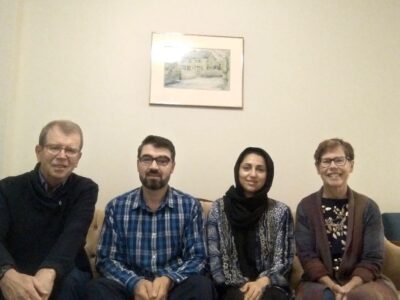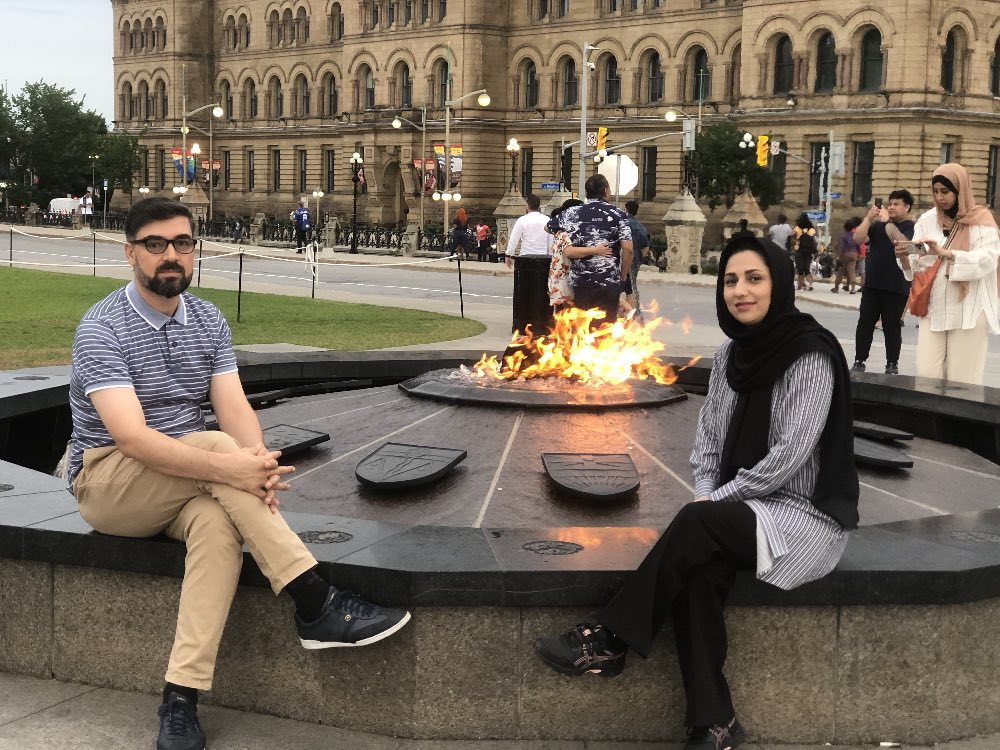Wahida Azizi recalls her last day of work in Afghanistan vividly.
An activist for women’s rights, Azizi advised women about their rights to be educated, to work, to avoid forced marriages for themselves and their daughters in her home province of Herat, but moved to Kabul after the Taliban threatened to kill her and her brothers.
She found work with an independent organization that monitored conditions for women working inside 33 departments of the Afghan government. But the situation wasn’t safe in Kabul either. A bus taking female staff to work was blown up killing 20 people. “We had some bomb explosions. Every morning when we went to the office, I didn’t know if I would come back or not,” she said.
On the morning of Aug. 15, 2021, she and a few colleagues were in their office in a building that was normally filled with about 300 people. Azizi stepped into the corridor and realized the building was empty and they were alone. Her colleague checked her phone and said, “The Taliban is coming into Kabul.” The government of Afghanistan had been at war with the Taliban, but until that day, it had controlled the capital. Azizi called her husband Tajuddin Farzam, who was part of the Afghan president’s staff. “Leave your office as soon as possible,” he told her. Azizi and her colleagues left everything. “All the streets were blocked by the traffic jam,” she said. “All the people tried to run, run anywhere.”
She and her husband had lots of documents in their home that showed we are employees and that she was a human rights activist. “We tried to put them in water to destroy them” or hide them, she told Crosstalk. But now the Taliban had access to their offices, computers, human resource databases. Some people fled to the airport to get out of the country, but Azizi and Farzam felt it was too dangerous to even try to get there. They stayed at home for about a month.
Until that point, the Taliban had said women were allowed to keep working, but Azizi and her collegues were not allowed to return to their offices. They organized a well-attended peaceful demonstration to call for women’s right to work and to education covered by the media. They kept their faces covered. The Taliban didn’t respond immediately, but later when Azizi and Farzam were not home, they came to their apartment looking for them. A neighbour called Azizi and warned them not to come home.
They stayed with friends and family, but they decided they had to try to get out of Afghanistan. Through some family members, they managed to get visas to go to Pakistan. Farzam’s brother gathered some documents and three sets of clothes from their apartment, and with Azizi disguised under a burqa, they drove to the border of Pakistan and made it out of the country.
They had hoped to make a new life in Pakistan, but when they finally got an appointment with the UN office for refugees, they were given only a case number. The UNHCR informed them that because there were so many refugees the Pakistani government would not allow them to give them refugee cards, which would have given them the right to stay in the country and work legally.
And so they were stuck in a tiny apartment in Islamabad with almost nothing aside from a small carpet, two plates and two glasses in 40 to 50 degree temperatures. “We had a fan, but most of the time we didn’t have power,” Azizi said. They tried to stay cool in the bath and tried to stay calm, but the stress was terrible. They couldn’t live in Pakistan with no income, and they couldn’t go home.
They were in contact with Farzam’s brother in Ottawa. Azizi told her sister-in-law, “We are in the worst situation in our life. I think our life is ending.” They didn’t have the means to sponsor them to come to Canada, but they looked for a way to help them and contacted a team at St. John the Evangelist in Ottawa, who have sponsored many refugees over the years in partnership with the Diocese, which is a Sponsorship Agreement Holder (SAH) with Immigration, Refugees and Citizenship Canada.
Azizi and Farzam were eligible to come to Canada under a special program called Operation Afghan Safety, created after the Taliban took power, but their sponsorship still took about seven months from the time the team put the application in until they arrived in Canada in late July.
“We love the people of Canada. They are so kind, they are so lovely. We feel we have new families here,” said Azizi, adding that they are eager to contribute to building Canada in ways they weren’t able to in Afghanistan.
Brian and Margot Cameron are part of the core team at St. John that sponsors refugees, which includes people from outside the church as well. The church’s history as sponsors goes back to the 1970s when “the boat people” came from Viet Nam. Over the last five years, they estimate they have helped bring more than 100 people to Canada from places such as Eritrea and Iraq.
Brian talked about the joy of seeing the newcomers succeed and and celebrating with them. In some cases, they stay in touch.

Once people are settled, they often want to bring their loved ones to safety in Canada as well, the Camerons said, so one sponsorship often leads to others.
As veteran members of a constituent group (sponsor), the Camerons say fundraising is a challenge and warn parishes considering doing a sponsorship that they may need to raise more money than the amount the Canadian government requires, particularly for accommodation.
“One of the ways we do it is by family sponsorships,” says Margot. “We co-sponsor with the family. The family raises the money. and we do the administration.”
Another option is to sponsor someone or a family with a Blended Visa Office-Referred program, in which the government shares the cost of supporting the newcomers during their first year in Canada.
The Camerons strongly recommend that anyone considering sponsorship complete the government’s online Refugee Sponsorship Training Program [www.rstp.ca], which provides a step-by-step guide. Margot also recommends getting in touch with groups who have sponsored refugees before.
The Refugee Ministry Office at Ascension House supports parishes considering or in the process of sponsorship. Case manager Ishita Ghose says she and her colleague Reem Abu Afieh can help by reviewing applications, ensuring they are complete and submitting them; following up if additional documents are required, and guiding applicants through the interview process. They can also contact the Immigration department if the family has faced any changes or adversities that might require the case to be expedited.
Ghose says the pace of case processing has picked up again since the pandemic. As of mid- November, the diocesan Refugee Ministry Office has helped 123 newcomers to Canada from 42 sponsorship cases.


Saint Mary’s Church, Westmeath — Deanery of the Northwest